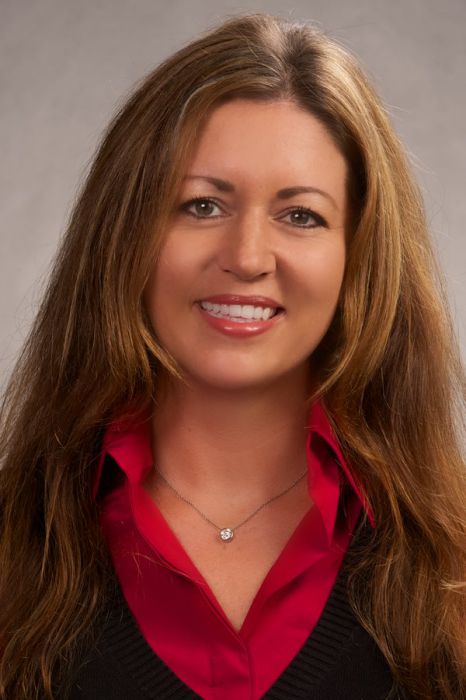 Associate professor of psychology Tara Victor’s interest in the brain was first piqued after taking a neuropsychology course as an undergraduate psychology major at Hanover College.
Associate professor of psychology Tara Victor’s interest in the brain was first piqued after taking a neuropsychology course as an undergraduate psychology major at Hanover College.
“I began to understand that my interest in basic brain research could turn into an applied clinical specialty. I knew immediately it was the right career path for me to pursue,” said Victor, who graduated from University of Kentucky with her bachelor’s in psychology, and went on to get her master’s and doctorate in clinical psychology from Michigan State University.
While her doctoral emphasis was in the neuropsychology of aging, it would be a research area she first worked on as an undergrad–neurocognitive malingering (faking or exaggerating symptoms for the purpose of some external gain)–that would ultimately become a major focus for her, beginning as a postdoctoral fellow in the Department of Psychiatry at Harbor-UCLA Medical Center under the mentorship of Kyle Brauer Boone, Ph.D., ABPP/CN, and continuing at CSU Dominguez Hills, where she joined the faculty in the Department of Psychology in 2006.
“Since starting at CSUDH, my research has primarily focused on the detection of feigned cognitive or psychiatric impairment and examining ethno-cultural bias on neuropsychological tests,” Victor said.
Clinical neuropsychological assessment, in a nutshell, is a characterization of brain-behavior relationships, and is often used to assess for impairment due to brain injury or disease. Accuracy in measurement is important and can be impacted by a number of different variables. As Victor explains, an individual might not “put forth their full effort” during testing for any number of reasons (from general fatigue to attempts to appear more impaired than they actually are in order to receive damages in the context of civil litigation). So included in the test battery are what Victor calls ‘performance and symptom validity indicators’ to ensure adequate levels of effort on the part of the person being tested. Accuracy in interpretation of neuropsychological test performance is also important, so taking into considering things like cultural, language, and early life experiences of the person is essential.
“If we’re trying to assess brain injury and disease then we want to make sure that we understand all the different variables that can influence test performance other than those things,” Victor explained further.
Victor has been awarded more than $2.5 million in grants for her research (as principal or co-investigator) in not only neuropsychology but also in the area of treating symptoms of post traumatic stress and chronic pain. She has been invited to lecture at several local universities, presented at numerous national and international conferences and been published in professional journals such as Professional Psychology: Research and Practice, Archives of Clinical Neuropsychology, The Clinical Neuropsychologist.
And much like she took part in research projects while in college, Victor involves her students in her research. Currently, she has two graduate students and four undergraduate students working with her in her lab on campus. Two of her undergraduates, MBRS RISE Scholars Geraldy Eisman and Chelsea McElwee, were among the winners of the 2014 CSUDH Student Research Day competition and represented the university at the state-wide CSU Research Competition.
“My students are wonderful,” Victor said. “And the work is mutually beneficial. They really help facilitate what I want to do in terms of my research interests, and experience in the lab is helpful to them to better understand the research process. Most of them are trying to get into graduate school.”
Victor’s research in neuropsychology testing is ongoing, but she is starting to turn her attention to other topics. She said she is particularly interested in the concept of self-deception, and how to differentiate between conscious feigning of symptoms versus medically unexplained symptoms.
“Some symptoms that are reported don’t make medical or neuropsychological sense, but they’re not consciously generated by the person; they’re not faking it in other words,” Victor said, using the example of a recent case in the news where a woman who wasn’t pregnant had all the symptoms, including changes in their physical appearance, of being pregnant. “How does that happen? How do you deceive yourself to that extent? I’m really interested in that. What are the neurobiological underpinnings of this kind of self-deception?”
She currently is reviewing literature on the topic and will be contributing a chapter to a book titled “Neuropsychology Evaluation of Medically Unexplained Symptoms: Assessment Primer” (K.B. Boone, ed; in preparation).
While research is a big part of who she is professionally, Victor said she equally enjoys teaching, how she learns from both but also the sharing of knowledge.
“When the light clicks on for students and you can see that they understand something that they didn’t understand before, it’s really rewarding and that can happen in the context of both the lab and the classroom. And I can relate to my own experience; those teachers who helped things click for me serve as inspirations for my own work.”
Victor is a member of several professional organizations, is a licensed and practicing psychologist by the California Board of Psychology, and is board certified in clinical neuropsychology by the American Board of Professional Psychology. She also serves as an assistant clinical professor for the UCLA California Semel Institute and is a consulting psychologist for the “Survivor” reality television series and for CBS Studios.